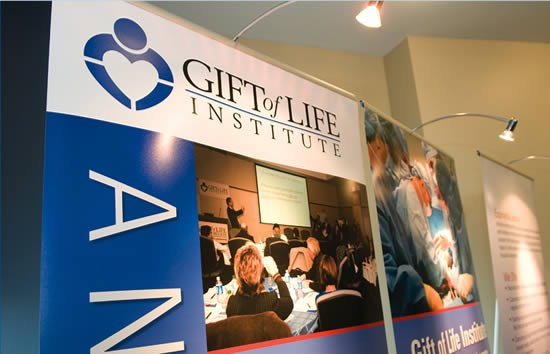Donation and Transplantation: Common “Mythconceptions”
For years, myths and misconceptions have prevented people from signing up as donors. In this blog, we tackle some of the most common "mythconceptions" about donation and transplantation.
If I’m in an accident and the hospital knows that I am designated as a donor, the doctors won’t try to save my life.
Truth: Doctors, nurses and paramedics will do everything they can to save your life. In fact, an individual must be in a hospital, on a ventilator and pronounced brain dead in order to donate organs. Organ Procurement Organizations (OPOs) are not notified until life-saving efforts have failed. The transplant team is not notified by OPOs until permission has been given by the deceased’s family.
If I am a registered donor, doctors may remove my organs before I have passed away.
Truth: Brain death (when the brain dies due to lack of blood and oxygen) is a medically, legally, and morally accepted determination of death. To determine brain death, more than one diagnosis of brain death and a series of tests over a period of time are required before the donor’s family is presented with the opportunity to donate.
Organs can be bought or sold on the black market.
Truth: These stories are untrue and have become harmful urban legends. Due to the complexity of transplantation, the necessity of involvement from highly trained medical professionals, the process of matching donors with recipients, the need for modern medical facilities and the support necessary for transplantation make it impossible for this to actually happen. The buying and selling of organs and tissues is illegal, as part of the National Organ Transplant Act.
I am too old to be a donor.
Truth: There is no set age limit for organ and tissue donation. At the time of death, trained medical professionals will evaluate patients on a case-by-case basis to determine which organs and tissues are suitable for donation. Therefore, people of any age who want to become organ and tissue donors should indicate it on their driver’s license and inform their family of their decision.
I have a history of medical illness. No one could benefit from my donation.
Truth: A person’s suitability for organ or tissue donation is always determined at the time of death. Clinical professionals from the organ and tissue donor program will review medical and social histories with the donor’s family at the time of death, on a case-by-case basis to determine if the donor is medically suitable.
Even if I say I want to only donate my corneas, they will take all of my organs.
Truth: You can specify which organ and tissues you want to donate in your will or by telling your family which specific gifts you would like to donate at the time of your death. Your decision will be followed.
I don’t need to tell my family that I’d like to be a donor because it’s already in my will.
Truth: By the time your will is read, it will be too late for you to be a donor. Telling your family now that you want to be an organ and tissue donor is the best way to make certain your decision is honored.
My family will have to pay if I become a donor.
Truth: Costs related to donation are no responsibility to you or your family.
My religion does not support organ or tissue donation
Truth: All of the major religions in this country approve of organ and tissue donation and consider it a gift – an act of charity. If you have questions, contact your religious advisor.
Organ and tissue donation means my body will be disfigured. My family will not be able to have an open casket funeral if I become a donor.
Truth: Donated organs are removed surgically, in a routine operation similar to other types of surgery. Doctors maintain the utmost dignity and respect for the donor at all times, so much so that donation will not interfere with traditional funeral arrangements such as an open casket.
Rich and famous people get moved to the top of the waiting list while “regular” people have to wait longer for a transplant.
Truth: The organ allocation and distribution system is blind to wealth or social status. The length of time it takes to receive a transplant is governed by many factors including blood type, length of time on the waiting list, severity of illness and other medical criteria. Factors such as race, gender, age, income or celebrity status are never considered when determining who receives an organ.
The recipient will know who I am.
Truth: Information about the donor is released to the recipient only if the family of the donor requests or agrees to it. Otherwise, the strictest confidence of patient privacy is maintained for both donor families and recipients.
Patricia Mulvania has more than 30 years’ experience in the healthcare field, beginning her career by providing emergency patient care in the pre-hospital setting. Since, Patti has served in leadership roles in the emergency department, homecare, and hospice arenas. She has extensive teaching and leadership experience in both OPO and healthcare fields, and has personally conducted and supervised OPO clinical activity, from initial donor referral through completion of organ recovery. Training professionals to compassionately and proficiently lead conversations with potential donor families that result in proactive, informed, and enduring donation decisions is her specialty.

